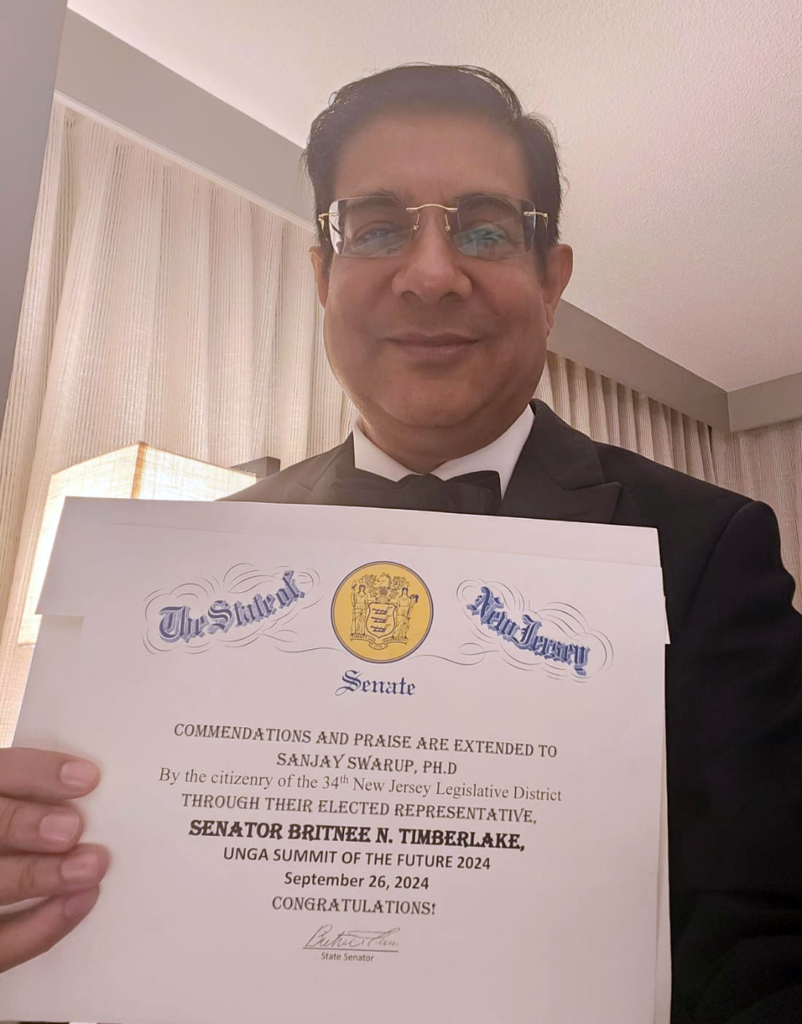Commendation for pioneering work on sustainable agriculture and environmental restoration - Associate Professor Sanjay Swarup, NERI Director, at the UNGA Summit of the Future, 26 September 2024
Associate Professor Sanjay Swarup was recently honoured at the United Nations General Assembly (UNGA) Summit of the Future 2024 with a commendation recognising his pioneering work in sustainable agriculture and environmental restoration. This article highlights Prof. Swarup’s reflections on the award, his impactful research on carbon-dense ecosystem restoration, and his vision for a sustainable future driven by interdisciplinary collaboration and global partnerships.

Interview with Associate Professor Sanjay Swarup:
Q: Congratulations on your commendation at the UNGA Summit of the Future. Could you share what this recognition means to you personally and for NERI?
Prof. Sanjay: “This came as a surprise, because this was not something that there was a nomination or anything. What happens is, every country has a UN mission, and they align their activities to the theme provided by the UN General Assembly, which, this year, was the Future Summit. The Senegalese mission from West Africa had organised the side event on Sustainable Agriculture, and they had identified me as a speaker. When I sent in my CV, they mentioned they would like to give this award, so that’s how I found out. I thought I was going for another talk, but it came with this surprise.”
“In terms of what it means for NERI, it’s a recognition for what’s happening in our part of the world and for our work in contributing to the bigger picture. It’s a validation that the work we are doing is meaningful, it’s being heard, and it’s being recognised. Large teams have been working on this at NERI for years, so to be recognised from far off, in New York, where this event was held, is very gratifying.”
Q: The commendation highlights your contributions to sustainable agriculture and environmental approaches. Could you elaborate on the specific areas of research that were recognised?
Prof. Sanjay: “They recognised our sustainable agriculture and environmental work, specifically our efforts to restore carbon-dense ecosystems in the region. One of our key projects is on restoring peatlands, which have been heavily degraded due to deforestation and their conversion into commercial plantations. While these plantations are economically necessary, they also have a large environmental impact. Being carbon-dense ecosystems, they emit a lot of carbon dioxide and methane, which impacts the climate significantly.”
“Peatlands are also crucial for biodiversity, nutrient cycles, water cycles, and they serve as major freshwater reserves. Our project through NERI focuses on restoring these ecosystems by working with large stakeholders to achieve scalability and make a broader impact. We’re also working with SUrF (NUS Research Centre for Sustainable Urban Farming) on urban farming in Singapore to address food security. Singapore imports over 90% of its food, so we’re exploring ways to sustainably grow fresh vegetables locally, which would align with the national agenda to ‘grow more from less.’”
Q: Looking to the future, what is your vision for this research and its global adaptability?
Prof. Sanjay: “Africa, particularly West Africa, is very interested in what we’re doing because the biggest population growth globally is projected to happen there, and at the same time, Africa has some of the Earth’s largest and most pristine forests. So there is a significant need for sustainable solutions there, especially with the risks posed by climate change, coastal sea-level rise, and the Sahara Desert in the north.”
“What I am saying here is to learn from nature and heritage. For example, in that part of Africa, they have a lot of biodiversity, much of which is used in the local food chain. By growing these responsibly, we can protect the environment, preserve culture, and support the economy. There’s also potential to create a value chain around their heritage crops, working with chefs and nutritionists to develop unique, sustainable cuisines. This is why we have collaborations with people from Cameroon, Senegal, and Singapore—to develop solutions tailored for Africa that also respect and leverage local heritage.”
Q: What drives your passion for environmental research and sustainability, and do you have any message for young researchers and the broader public?
Prof. Sanjay: “I’ve been in research for over 30 years in Singapore alone, and during that journey, I went from learning how to do things to realising we need to do more to address urgent environmental issues. The Earth is in a very bad shape, environmentally speaking. Sustainability is now at the top of the agenda in every sector, and we need to slow down the degradation process—if not reverse it.”
“I’m a big proponent for early-career scientists and students to go beyond their comfort zones. There are many ways to help in sustainability, so find your niche, keep working at it, and don’t give up. If the heart is there, you won’t burn out; instead, you’ll want to keep going further. I think it’s also essential for young people to understand the importance of teamwork. For complex problems, we need to build complex teams, which means working with people who may not fully understand our areas but bring valuable insights from their own fields.”
Q: Finally, what are some of NERI’s immediate goals, and how can the public or other researchers support these initiatives?
Prof. Sanjay: “At NERI, we’ve been working on environmentally friendly and ecologically sound solutions that span medical science, engineering, social sciences, and increasingly, policy. Moving forward, our goal is to identify complex challenging areas that can’t be solved at individual levels. NERI can act as a catalyst and coordinator, bringing the relevant people together to make a more significant and holistic impact.”
“Our hope is that our work will impact various parts of the world. We’re centred in Singapore, but our methods, such as those for peatland restoration, are applicable globally. We invite the public, fellow researchers, and organisations to join us in this mission. It takes time, so don’t be in a rush, but be consistent. Collaboration and perseverance are essential to creating lasting environmental change.”

